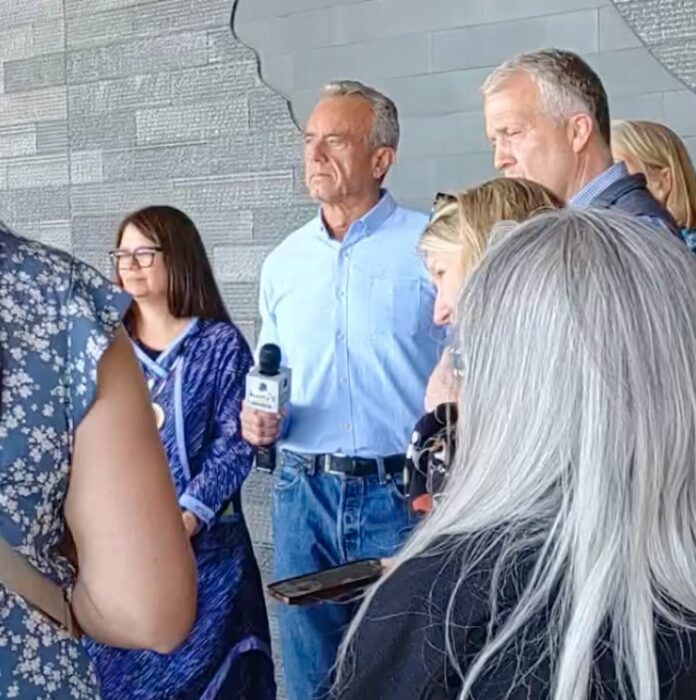By LINDA BOYLE
HHS Secretary Robert F. Kennedy Jr. met with the Alaska Native Health Board in Anchorage on Aug. 5, joining Senators Lisa Murkowski and Dan Sullivan to address issues ranging from tribal sovereignty to Medicaid rules and the future of vaccine development.
In a press conference after the meeting, Kennedy pledged to be “the best HHS secretary for the tribes” in the agency’s history. The discussion covered three broad topics: Native sovereignty, budget and Medicaid provisions in the newly passed One Big Beautiful Bill, and changes to vaccine policy.
Native Sovereignty
Kennedy said HHS is working with Interior Secretary Doug Burgum and Agriculture Secretary Brooke Rollins to remove barriers to food sovereignty, with a focus on supporting subsistence and nutritional foods over processed products. He warned that processed foods have replaced many traditional Alaska Native foods and “are literally killing” Native people.
Alaska Native Health Board Interim President Natasha Singh closed the meeting by thanking Kennedy for his commitment to tribal nations. She noted they discussed the potential transfer of the Alaska Native Medical Center from federal control to the Alaska Native Health Consortium, a move she hopes to explore further in future talks.
Medicaid Rules in the Big Beautiful Bill
Sen. Dan Sullivan asked Kennedy to address rumors that Medicaid had been cut under the BBB. Kennedy said there were no cuts, but confirmed that the government is cracking down on people who collect Medicaid benefits in more than one state or while simultaneously enrolled in Obamacare, practices that are illegal.
Sen. Lisa Murkowski raised concerns about the bill’s Medicaid work requirement, which could prevent some non-working individuals from qualifying. The BBB exempts Alaska Natives and Native Americans from work requirements for both Medicaid and SNAP.
The bill also establishes a Rural Transformation Program to provide new financial support for rural hospitals. Medicaid currently spends about $20 billion annually — roughly 7% of its budget — on rural hospital care. The BBB will add $50 billion over five years, with states required to apply for funding. Kennedy encouraged Alaska to do so.
Vaccine Policy Changes
Kennedy announced that the Biomedical Advanced Research and Development Authority will end 22 mRNA vaccine development projects, worth more than $500 million, citing their limited effectiveness against upper respiratory infections like Covid-19 and the flu. While some contracts nearing completion may proceed, no new mRNA-based initiatives will begin.
The decision affects projects at Moderna, Emory University, Pfizer, Luminary Labs, and AstraZeneca. Kennedy stressed that the move does not impact mRNA research for cancer vaccines.
He said mRNA vaccines are designed for one specific protein, which can increase the risk of viral mutation, as seen with Covid-19. The agency will redirect the $500 million toward research into universal vaccines for flu and Covid-19 that mimic natural immunity and are less susceptible to mutation, though he acknowledged all drugs carry potential side effects.
“HHS supports safe, effective vaccines for every American who wants them,” Kennedy said. “That’s why we’re moving beyond the limitations of mRNA and investing in better solutions.”
Following the announcement, Moderna’s stock price fell. There is always a money catch to everything.
Linda Boyle, RN, MSN, DM, was formerly the chief nurse for the 3rd Medical Group, JBER, and was the interim director of the Alaska VA. Most recently, she served as Director for Central Alabama VA Healthcare System. She is the director of the Alaska Covid Alliance/Alaskans 4 Personal Freedom.
